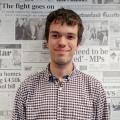
A WOMAN has spoken out on her experiences with a condition described as 'poorly understood' by the NHS.
Zo Rollings, 72, had polio when she was four years old. She now has Post Polio Syndrome, a condition which typically develops 15 years or more after the infection.
Zo is now encouraging other survivors in Cumbria to attend meetings run by the north-west division of the British Polio Fellowship in Blackpool.
She said she had a 'vivid memory' of complaining about having aching legs to her mother after she woke up her up to go to a wedding.

"The bride was our lodger and I was leaving for her wedding from our house and I was her flower girl," she said.
"I remember the day clearly and my next memories are of frequently visiting the Nottingham Children’s Hospital, having to walk up and down for a doctor to observe and being told to return in two weeks - nothing ever changed."
READ MORE: Issues found over death of baby at Furness General Hospital
Although Zo has spent decades living in Barrow and Ulverston, her Polish parents met in a displaced persons camp in Horsham, Sussex and spoke 'very little English.'
"They did their very best for me," she said. Her father, who worked down the pits, paid for private consultations with bags of coal.
Zo said polio affects her whole body but her left side is weaker. Her right leg has therefore had to compensate for nearly 70 years leading to her skeleton readjusting.
She has visited her chiropodist every five weeks since her late-20s, an osteopath every six weeks, and a physical therapist for a massage every three to four weeks.
"I am fortunate that I can pay for this and I know what my body needs," she added.
Post Polio Syndrome affects around 60 per cent of individuals who previously had polio. Symptoms include chronic fatigue, muscle weakness, muscle and join pain and breathing difficulties which can cause problems such as sleep apnoea.
Speaking about why the fellowship is important to her, she said: "People in my situation need support and information and few groups know anything about it because of the eradication of polio in this country."
For up to 1 in 100 people the virus causes temporary or permanent paralysis, with most not having symptoms. Cases fell in the 1950s with the introduction of routine vaccination and there has not been a case in the UK since the mid-90s.
The virus still can be found in other parts of the world so there is a small risk of it being brought back to this country. There is no cure for polio.
The next British Polio Fellowship meeting will be at the Argosy Community Centre on Forshaw Avenue from 11.30am to 1.30pm on September 25. To attend, please contact Charlotte McDonagh on 08000 431935. Her email is charlotte@britishpolio.org.uk.



Comments: Our rules
We want our comments to be a lively and valuable part of our community - a place where readers can debate and engage with the most important local issues. The ability to comment on our stories is a privilege, not a right, however, and that privilege may be withdrawn if it is abused or misused.
Please report any comments that break our rules.
Read the rules here